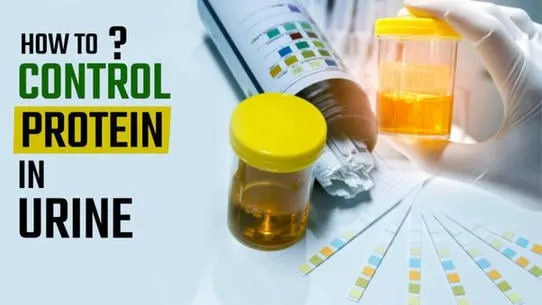
The presence of excess protein in urine, or proteinuria, can be a serious health issue. A healthy kidney removes toxins from the body in the form of urea and ensures that the proteid is supplied back to the blood for regulated body mechanisms. At times, due to any factor, the kidney filter might not work properly, which may result in the passing of protein along with the urea. This will create a protein deficiency in the body that may result in various other diseases.
While looking for potential methods on how to reduce protein in urine, you must understand that there may be a certain quantity of proteid that is acceptable, but the problem arises when it crosses the permissible level. Let's do a do a deep dive to discuss causes, symptoms, complications, and solutions for how to reduce protein in urea.
There are several factors leading to the presence of excess proteinuria. Some of these may be:
The increased level of proteinuria can be easily identified by certain symptoms. Some of which are listed below:
The most prominent diagnostic test before proceeding with the cure for protein in urine is to go through a urine test. The urine test is performed in a few ways:
UACR test: This test not only helps indicate the presence of proteid but also helps measure the level of protein. Experts coined the term for this test as the urea albumin-to-creatinine ratio, or UACR. It comparatively measures the level of albumin to the creatinine. A UACR above 30 mg/g indicates kidney disorders, immediately needing help.
Dipstick test: This is another widely used diagnostic method for proteinuria. In this, the doctor analyzes urea by using a dipstick, a plastic tool with a coating of a chemical that changes its color based on different levels of proteid.
GFR test: The doctor may also use a GFR (Glomeruli Filtration Rate) or blood test to understand the kidney's ability to filter blood and catch any abnormality.
There may be several life-threatening complications caused by the presence of excess proteinuria. Some of these are mentioned below:
It is quite significant to look for the proper solution for how to reduce protein in urine to stop the disease from getting severe and causing the above-mentioned complications.
While looking for how to reduce proteinuria queries online, you must have come across certain treatment strategies depending on the causes. There are several immediate and long-term factors that may enhance the risk of an increased level of proteinuria. It is highly significant to diagnose the actual cause for the suitable treatment method. You can consult your physician to recommend the best method. However, if you want a holistic approach to treatment, you can take advantage of Ayurvedic treatment methods. Ayurveda believes in treating the disease from the root, along with the symptoms. The ayurvedic expert might diagnose the actual cause and, based on that, suggest utilizing natural herbs, treatment therapies such as Panchakarma, and certain dietary alterations.
Contact any expert or Karma Ayurveda’s kidney experts for the ultimate solution to your query of how to decrease albuminuria.
Q: How to decrease protein in urine naturally?
A: The presence of excess proteinuria is a sign of poor kidney health. Take appropriate care of the probable risk factors that might affect your kidney health, such as staying hydrated, eating a proper diet, reducing salt intake, and more.
Q: What is a high level of proteinuria?
A: In general, the level of protein above 150 milligrams per day is serious and requires professional help.
Q: How much protein in the urine is normal?
A: The normal range for protein in urine is 150 mg/day. You should seek medical help above this level.
Q: How do you check proteinuria?
A: A dipstick test is used to check protein levels in urine, and extensively testing urine in the laboratory is also a good way to detect proteinuria.
Q: How to decrease protein in urine during pregnancy?
A: You should consult your healthcare expert to detect the actual reason contributing to the condition and seek a cure for proteinuria.
Q: Is the treatment for high protein in urine possible?
A: The treatment for high albuminuria is available in modern allopathy as well as in Ayurveda. You should consult an expert for the best possible solution.
Q: Is the kidney-leaking protein treatment available?
A: Yes, kidney-leaking protein treatment is available. You should seek the advice of an expert on the diagnosis and treatment strategy.
Q: Is the cure for proteinuria possible?
A: Yes, proteinuria is curable in a systematic way by suitably detecting the cause and then deciding the treatment strategy.
Q: What is the expected duration of a natural cure for proteinuria?
A: The expected duration of the natural cure for albuminuria will be highly subjective, as it depends on the inherent cause and severity.
Q: How to decrease albuminuria with the help of Ayurveda?
A: The treatment of proteinuria in ayurveda proceeds with the detection of the cause and, based on that, proposes suitable herbs, treatment therapies, and dietary alterations
Second Floor, 77, Block C, Tarun Enclave, Pitampura, New Delhi, Delhi, 110034